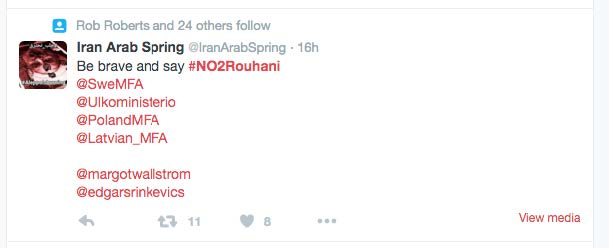
The call comes ahead of a visit by the Iranian Foreign Minister Mr. Javid Zarif to Poland and three other EU countries this week for cooperation talks. Mr. Javid Zarif trip began in Poland on Monday, Finland on Tuesday, Sweden on Wednesday and Latvia on Thursday.
Focus will be on these governments in whether they will push for open dialogue on the human rights’ situation in Iran. Various human rights’ organizations are ready to condemn their silence if they fail to speak out against the regime’s continued abuses.
In a call to The Media Express news agency on Saturday prominent Polish academic Dr. Filip Kaczmarek, also former Member of the European Parliament, gave reaction to this Monday’s visit by the Iranian Foreign minister Mr. Javid Zarid to Poland, where government officials are meeting the Iranian Foreign minister for cooperation talks on economy and trade.
Dr. Kaczmarek said ‘I think that the main argument for this visit is for trying to deepen economic relations. But from my perspective the EU member states, policy should be coherent.’
Drawing attention to the Action Plan on human rights and democracy which, he said, has been adopted by European Parliament EU members states, running 2015-2019, highlighting the Action Plan’s subtitle which reads “Keeping Human Rights at the heart of the EU agenda.”
Adding also ‘[he] thinks simply that Iran is not a country which respects human rights,’ so ‘the task of the politicians is to do business but also to bring the point of human rights’ issues.’
On the role of business and ethics within the EU, Dr. Kaczmarek said ‘we have this CSR concept called Corporate Social Responsibility, [meaning that] the business community should not be only focused on profit,’ extending to the fact that ‘[human rights] shouldn’t be forgotten if, as Europeans or as the EU, we want to be credible and to fulfill our own commitment and our own values.’
In a call on Friday to the People’s Mojahedin Organizaiton of Iran (PMOI / MEK), the main Iranian opposition group, its spokesperson Mr. Shanin Gobadi expressed concern. Mr. Godabi told The Media Express news agency ‘this sort of [diplomatic] trip only emboldens the clerical regime in its wave of executions and suppression inside Iran as well as its war mongering and export of terror outside of Iranian borders.’
The PMOI / MEK spokesperson also pointed out that ‘every day constant news of more executions, more egregious human rights’ abuses, more anti-human medieval punishments’ are reported in Iran. Concluding that ‘in that setting [of human rights’ violations] accepting Javid Zarif simply is tantamount to glossing over the dreadful human rights’ situation in Iran.’
The position of the PMOI is clearly that ‘we think any improvement of relationships with this regime should be conditioned upon improvement of the human rights’ situation in Iran, particularly the halting of executions.’
Humanitarian organizations are also urging the Polish government to release statements condemning the increasing human rights’ violations by the Iranian regime and to halt executions in the country, but also Finland, Sweden and Latvia.
A total of 64 people have been executed by the regime in May alone, many occurring at the same time that EU heads of state, MPs but also high ranking UN officials have been in talks with the regime.
Social media campaigns condemning the Iranian Foreign Minister’s European visit for cooperation talks are marked with hashtags #No2Rouhani and #FreeIran:
Mr. Javid Zarif’s EU state visit comes at a time when, on Saturday 21st May, Danish protestors rallied in the city of Aarhus to denounce the regime’s human rights’ violations; also urging European officials to ‘make improvements of relations with Tehran contingent on cessation of executions.’

Furthermore, The Media Express also spoke with the former European Parliament Vice-President, Mr. Alejo Vidal-Quadras last week. Asking Mr. Quadras to comment on the responsibility of high ranking EU officials to talk about human rights’ violations.

Mr. Vidal-Quadras, who is currently president of the International Committee in Search of Justice (ISJ), said that ‘change for Iran must be applied economic[ally] but also [through] diplomatic pressures and Western [EU member] countries must profit where there is more dialogue. [We must] increase diplomatic and economic pressure, not decrease it, in the domain of human rights.’
